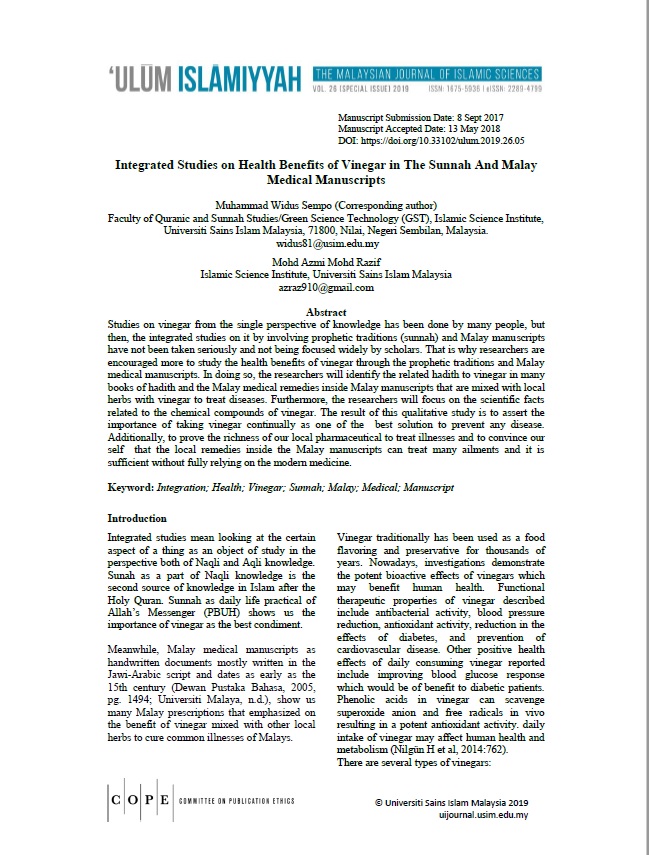Integrated Studies on Health Benefits of Vinegar in the Sunnah and Malay Medical Manuscripts
DOI:
https://doi.org/10.33102/uij.vol26no.112Keywords:
integration, health, vinegar, sunnah, malay, nutrition, food, manuscript, Islam, Islamic studiesAbstract
Studies on vinegar from the single perspective of knowledge has been done by many people, but then, the integrated studies on it by involving prophetic traditions (sunnah) and Malay manuscripts have not been taken seriously and not being focused widely by scholars. That is why researchers are encouraged more to study the health benefits of vinegar through the prophetic traditions and Malay medical manuscripts. In doing so, the researchers will identify the related hadith to vinegar in many books of hadith and the Malay medical remedies inside Malay manuscripts that are mixed with local herbs with vinegar to treat diseases. Furthermore, the researchers will focus on the scientific facts related to the chemical compounds of vinegar. The result of this qualitative study is to assert the importance of taking vinegar continually as one of the best solutions to prevent any disease. Additionally, to prove the richness of our local pharmaceutical to treat illnesses and to convince our self that the local remedies inside the Malay manuscripts can treat many ailments and it is sufficient without fully relying on the modern medicine.
Downloads
References
Abu Isa Al-Tirmidhi, Muhammad bin Isa bin Sawrah. 1975. Sunan Al-Tirmidhi. Studied by Ahmad Muhammad Syakir et al. 2nd edition. Egypt: Matbaah Mustafa Al-Babi Al-Halabi.
Ahmad bin Muhammad bin Hanbal. n.d. Musnad Al-Imam Ahmad bin Hanbal. Studied by Syuaeb Al-Arnaut et al. Muassasah Al-Risalah.
Al-Darimi, Abdullah bin Abd Al-Rahman. 2000. Musnad Al-Darimi. Studied by Husain Salim Asad Al-Darani. 1st edition. Arab Saud Kingdom: Dar Al-Mughni.
Al-Munawi, Abd Al-Rauf bin Taj Al-Arifin bin Ali. 1356 H. Faed Al-Qadir Syarh al-Jami’ Al-Sagir. 1st edition. Egypt: Al-Maktabah Al-tijariyah Al-Kubra.
Al-Nasa’i, Ahmad bin Syuaeb bin Ali. 2001. Al-Sunan Al-Kubra. Studied by Hasan Abd Al-Mun’im. 1st edition. Beirut: Muassasah Al-Risalah.
Al-Sindi, Muhammad bin Abd Al-Hadi. t.th. Hasyiah Al-Sindi ala Sunan Ibn Majah. Beirut: Dar Al-Jail.
Dewan Bahasa dan Pustaka. (2005). Kamus Dewan. 4th edition. Kuala Lumpur, Malaysia.
Ibn Majah, Muhammad bin Yazid Al-Qazawaeni. n.d. Sunan Ibn Majah. Studied by Muhammad Fuad Abd Al-Baqi. Dar Ihya’ Al-Turath Al-Arabi.
Ibn Qutaybah, Abdullah bin Muslim. Al-Jarathim. Studied by Muhammad Jazim Al-Hamidi. Damascus: Wizarah Al-Thaqafah.
Muhamamd Salih Al-Munjid. 2017. Al-At’imah. https://islamqa.info/ar/220217
Nawawi, Abu Zakariya Muhyiddin Yahya bin Syaraf. 1392. Al-Minhaj, Syarh Sahih Muslim. Cet. 2. Beirut: Dar Ihya’ Turath Al-Arabi.
Nilgün H et al. 2014. Functional Properties of Vinegar. Journal of Food Science, vol. 79. No. 5.
Syaraf Al-Haq, Muhammad Asyraf bin Amir. 1415 H. Awn Al-Ma’bud Syarh Sunan Abi Daud. 2nd edition. Beirut: Dar Al-Kutub Al-Ilmiyah.
UC Cooperative Extension Cottage Foods. n.d. Vinegar.
Universiti Malaya. (n.d.). My MyManuskrip. http://spcats.umlib.um.edu.my/mymanuskrip/about.asp, 24/02/2018.

Downloads
Published
How to Cite
Issue
Section
License
If the article is accepted for publication, the copyright of this article will be vested to author(s) and granted the journal right of first publication with the work simultaneously licensed under the Creative Commons Attribution-NonCommercial 4.0 International License, unless otherwise stated. Anyone may reproduce, distribute, translate and create derivative works of this article (for both commercial and non-commercial purposes), subject to full attribution to the original publication and authors. The full terms of this licence may be seen at https://creativecommons.org/licenses/by-nc/4.0/.






